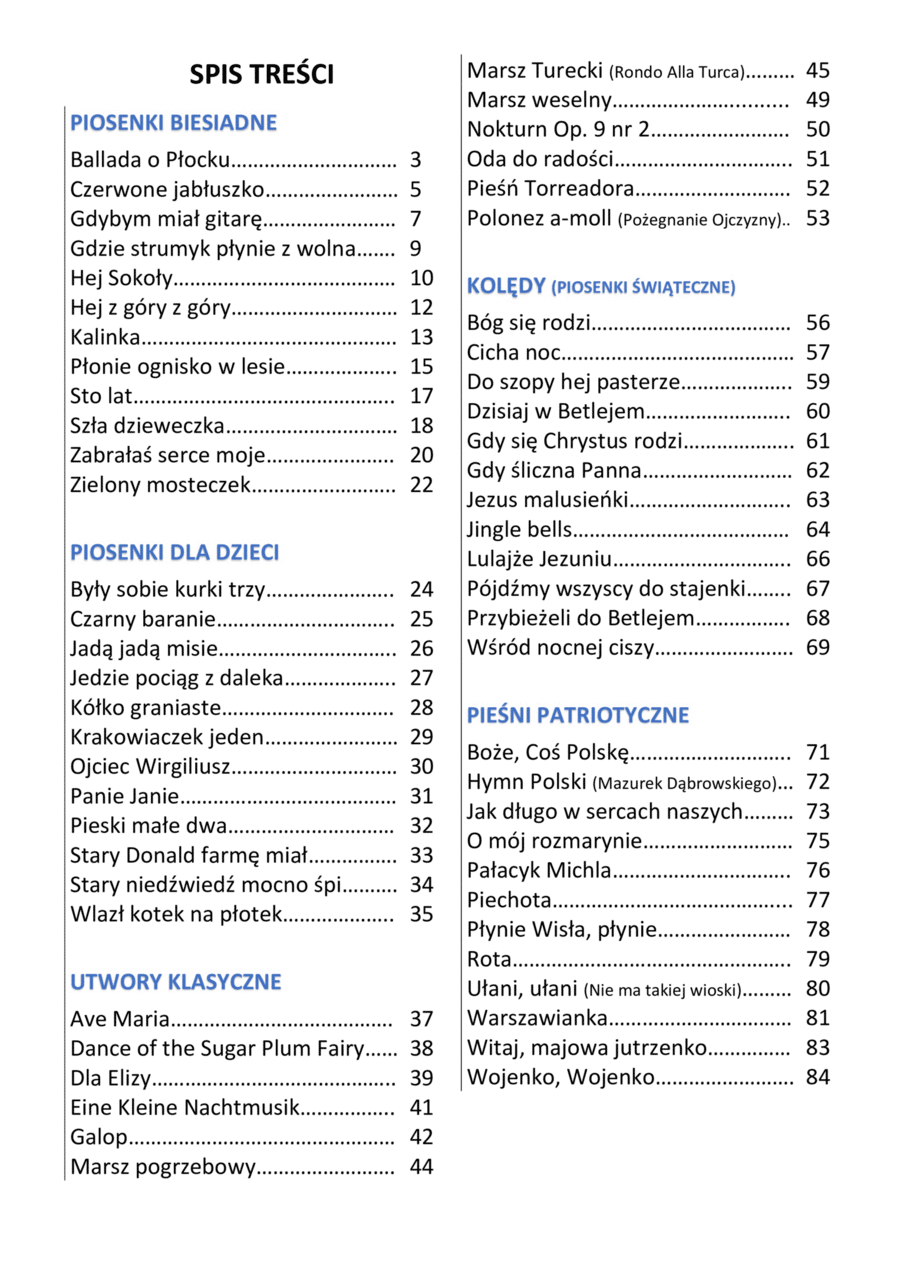C Instrument - Digital Download SKU: A0.1355009 By Carols, Christmas Song, Classical Music, Polish Children Song, Polish Christmas Carol, and Polish Patriotic Songs. By Carols, Christmas Song, Classical Music, Polish Children Song, Polish Christmas Carol, and Polish Patriotic Songs. Arranged by Darek. Children,Christmas,Classical,Folk,Multicultural,World. Lead Sheet / Fake Book. 84 pages. Darek #939722. Published by Darek (A0.1355009). Polish Sheet Music Collection - 60 Songs from Various Categories [Lead Sheet]A collection of sheet music for songs FOR EVERY OCCASION in the melody + chords version.Instrument: Universal, Number of songs: 60, Lyrics: Available for all songs except classical music, Chords: Included, Number of pages: 84.This collection is everything you need to get started - you will find feast songs, children's songs, classical songs, Polish carols and Christmas songs, and Polish patriotic songs. In total, there are as many as 60 songs for every occasion.All notes are prepared in melody and chord versions, which allows you to play melodies and easily accompany singing (also on the guitar).Each piece has fingering, i.e. information written next to the notes on which fingers to play given sounds.All songs (except classical songs) have lyrics added under the notes, making it easier to accompany them on the piano while singing.Song list: Ballada o Płocku Czerwone jabłuszko Gdybym miał gitarę Gdzie strumyk płynie z wolna Hej Sokoły Hej z góry z góry Kalinka Płonie ognisko w lesie Sto lat (eng. Happy birthday) Szła dzieweczka Zabrałaś serce moje Zielony mosteczek Były sobie kurki trzy (eng. Twinkle, Twinkle, Little Star) Czarny baranie Jadą jadą misie Jedzie pociąg z daleka Kółko graniaste Krakowiaczek jeden Ojciec Wirgiliusz Panie Janie (eng. Brother John) Pieski małe dwa Stary Donald farmę miał (eng. Old MacDonald Had a Farm) Stary niedźwiedź mocno śpi Wlazł kotek na płotek Ave Maria Dance of the Sugar Plum Fairy Dla Elizy (eng. For Elise) Eine Kleine Nachtmusik Galop Marsz pogrzebowy eng. Funeral March) Marsz Turecki (eng. Rondo Alla Turca) Marsz weselny (eng. Wedding March) Nokturn Op. 9 nr 2 Oda do radości (eng. Ode to joy) Pieśń Torreadora (eng. Toreador Song) Polonez a-moll Pożegnanie Ojczyzny Bóg się rodzi Cicha noc (eng. Silent Night) Do szopy hej pasterze Dzisiaj w Betlejem Gdy się Chrystus rodzi Gdy śliczna Panna Jezus malusieńki Jingle bells Lulajże Jezuniu Pójdźmy wszyscy do stajenki Przybieżeli do Betlejem Wśród nocnej ciszy Boże, Coś Polskę Hymn Polski (Mazurek Dąbrowskiego) (eng. Polish Antem) Jak długo w sercach naszych O mój rozmarynie Pałacyk Michla Piechota Płynie Wisła, płynie Rota Ułani, ułani (Nie ma takiej wioski) Warszawianka Witaj, majowa jutrzenko Wojenko, Wojenko For Various Instruments | Piano | Keyboard | Guitar | Flute | Violin | Saxophone | Glockenspiel | Grand Piano | Polish Christmas Carol | Polish Children Song | Classical Music | Christmas Song | Carols | Polish Patriotic Songs | Traditional | Traditional Carols | Digital Sheet Music | Lead Sheet Arrangement | Festive Holiday Music | Christmas Carol Arrangement | Polish Folk Music | Holiday Music Collection | Seasonal Sheet Music.
